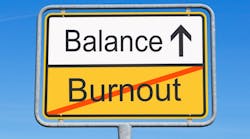Recently half of the participants in a survey conducted by RDH Magazinedisclosed that they were already burned out or could see it happening in the next five years. While we may think that burnout is an experience singular to dental hygiene, the truth is that this something all Americans are feeling in virtually every profession.
The incidence of burnout is so prevalent in the United States that it has caught the attention of researchers at Harvard University. Srinivasan S. Pillay, a psychiatrist and an assistant clinical professor at Harvard Medical School, recently surveyed a random sample of 72 senior leaders and found that nearly all of them reported at least some signs of burnout and that all of them noted at least one cause of burnout at work. According to a report by Gallup, Inc., a research-based organization that polls in 160 countries, 70 percent of American workers are not engaged or are actively disengaged. While this report is geared toward managers and CEOs, it’s an interesting look into what America’s workforce is feeling in regards to their work. For purposes of this poll, Gallup defines employees this way:
- Engaged
Employees work with passion and feel a profound connection to their company. They drive innovation and move the organization forward. - Not Engaged
Employees are essentially “checked out.” They’re sleepwalking through their workday, putting time — but not energy or passion — into their work. - Actively Disengaged
Employees aren’t just unhappy at work; they’re busy acting out their unhappiness. Every day, these workers undermine what their engaged coworkers accomplish.
What makes an employee engaged as opposed to disengaged has a lot to do with the company they are working for and personal work ethic models. However, certain factors have contributed to increased job dissatisfaction. The post-recession workforce has demanded more from everyone while offering little in return. We are all working more (and harder) for less — less salary, fewer benefits, less appreciation from our patients, and less respect from our employers. Recently, I read a verydisturbing article written by an office manager in which she advocates reducing a hygienist’s compensation to increase profitability:
“A quick way to put your hygienist’s compensation in proper proportion to their production seems to be to pay your hygienist say, 35% of their production. If you make this change from a salaried $30/hour hygienist and start the next month paying 35% of production, you need to be prepared for your hygienist to quit. If you’re seeing the increased supply [in dental hygienist availability] like I am, you may be more comfortable taking that risk.”
Personally I feel bombarded by the Internet and social media. The rise of digital technology has created a voracious appetite for information that we feel compelled to read and respond to at all hours of the day and night.
Though we can’t change the ways of the world with a snap of our fingers, I have some advice on preventing — or at least delaying — burnout.
- Do not work more than 35 hours a week
Besides being physically taxing, the monotony and demands of our profession can easily exhaust even the most energetic hygienist. Additionally, while we think more money will make us happy, what is most important is how we spend that money. Researcher Mike Norton from the Harvard Business School has done some interesting research regarding money and happiness. Watch his TED lecture. You won’t regret it. - Work in more than one office
Not having to deal with the same co-workers every single day can go a long way towards easing the stresses that accompany negative personalities - Volunteer
You may think you are too busy to donate your time and skills to help others, but the return on this investment is greater than you think. - Take a break
Employees who take a break every 90 minutes report a 30 percent higher level of focus than those who take no breaks or just one during the day. - Take a nap
Thelength of the nap is very important. Taking a 10- to 20-minute power nap can give you a quick burst of alertness and mental clarity. - Take a walk
The benefits of walking have been widely reported and include reduced risk of heart disease, diabetes, dementia, osteoporosis, and obesity. Those are just the long-term effects. Walking also gives off an immediate effect by releasing feel-good endorphins into the bloodstream, which reduces stress and anxiety. - Go off the grid
Take a Tech Sabbath. Shut off or put away your cellphones, computers, tablets, and anything else that connects you to the rest of the world and enjoy the company of your friends, your pets, or your neighbors.
Most Americans define success as the acquisition of money and power. In allowing these two metrics to be the focal point of our lives we miss out on the bigger picture. In her new book, "Thrive: The Third Metric to Redefining Success and Creating a Life of Well-being, Wisdom, and Wonder," Arianna Huffington suggests a third metric of success: thriving. When you thrive, you take care of your health, get enough sleep, and do not live to work. Changing your mindset and definition of success will allow you to value the important things in life.
If you are experiencing burnout in your dental hygiene career, understand that it is not because of the profession, per se, but because of outside factors. Every single profession has its pros and cons. Ensuring a long, enjoyable career has more to do with managing the internal factors than in struggling to change external factors such as the mindsets of employers, staff members and patients. In order to be the best dental hygienist you can be, you must first take care of yourself: your body and mind.








